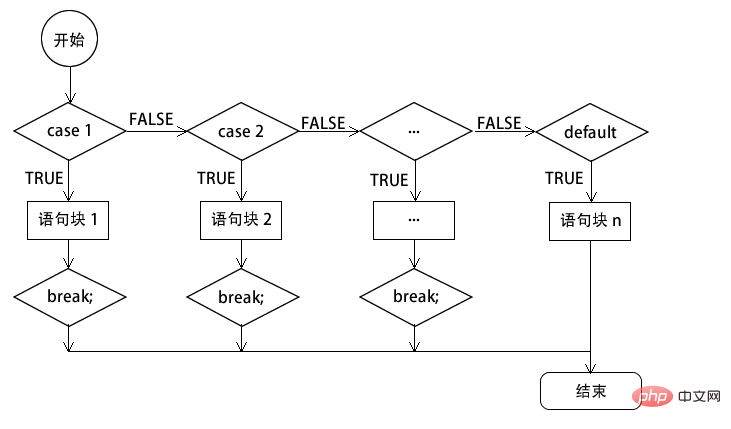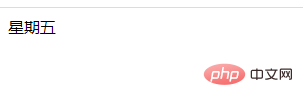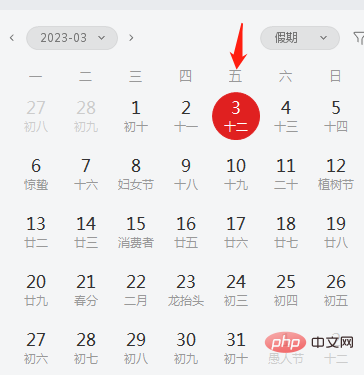How to use php default
In PHP, the default keyword needs to be used together with the switch statement to perform different actions based on different conditions. The switch statement is a conditional selection statement. First, the case value that satisfies the condition will be found as the program entry after execution; if all cases are not satisfied, the default entry will be found. If not found, the entire switch statement will be exited. Default is an alternative entry, but for error or logic checking, the default branch should be added to the switch statement.

The operating environment of this tutorial: windows7 system, PHP8 version, DELL G3 computer
In PHP, the default keyword needs to be the same as Used together with switch statements.
The switch statement can be used to perform different actions based on different conditions. The switch statement is a conditional selection statement. First, the case value that satisfies the condition will be found as the program entry after execution; if all cases are not satisfied, the default entry will be found. If not found, the entire switch statement will be exited; so default is just a It doesn't matter if you have a backup entrance or not. But for error checking or logic checking, the default branch should still be added to the switch statement.
The switch statement consists of an expression and multiple case labels. The case label is followed by a code block, and the case label serves as the identifier of this code block. The syntax format of the switch statement is as follows:
switch(表达式){
case 值 1:
语句块 1;
break;
case 值 2:
语句块 2;
break;
... ...
case 值 n:
语句块 n;
break;
default:
语句块 n+1;
}The switch statement will compare it with the value in the case in turn according to the value of the expression. If they are not equal, continue to search for the next case; if they are equal, the corresponding execution will be performed. statement until the switch statement ends or break is encountered.
Generally speaking, the switch statement ultimately has a default value default. If no matching condition is found in the previous case, the default statement will be executed, similar to the else statement.
The execution flow of the switch statement is shown in the figure below:

Example: Use the date() function to get the English abbreviation of the current week, and print today’s date based on the abbreviation Day of the week
<?php
header("content-type:text/html;charset=utf-8");
$week = date('D');
switch($week) {
case 'Mon' :
echo '星期一';
break;
case 'Tue' :
echo '星期二';
break;
case 'Wed' :
echo '星期三';
break;
case 'Thu' :
echo '星期四';
break;
case 'Fri' :
echo '星期五';
break;
case 'Sat' :
echo '星期六';
break;
case 'Sun' :
echo '星期日';
break;
}
?>

Extended knowledge:
You should pay attention to the following when using the switch statement A few points:
The difference from the if statement is that the data type of the expression after the switch statement can only be integer or string, not bool. Usually this expression is a variable name. Although PHP is a weakly typed language, the variable in the expression after switch can be any type of data. However, in order to ensure the accuracy of matching execution, it is best to only use one of the integers or strings. type.
Different from the if statement, the curly braces after the switch statement are required.
The number of case statements is not specified and can be increased indefinitely. But there should be a space between the case label and the value after the case label, and there must be a colon after the value, which is part of the syntax.
After the switch matching is completed, the statements in the matched branch modules will be executed one by one, and execution will not stop until the switch structure ends or a break statement is encountered. Therefore, if there is no break statement written after a branch statement, the program will continue to execute the content of the next branch statement.
Similar to the else in the if statement, the default label in the switch statement is directly followed by a colon. It seems that there is no condition, but in fact it is conditional. The condition is the "expression" The value cannot be equal to the value after any previous case label, then the statement in the default branch will be executed. The default label is the same as the else clause in if. It is not required in the switch statement and can be omitted.
Recommended learning: "PHP Video Tutorial"
The above is the detailed content of How to use php default. For more information, please follow other related articles on the PHP Chinese website!

Hot AI Tools

Undresser.AI Undress
AI-powered app for creating realistic nude photos

AI Clothes Remover
Online AI tool for removing clothes from photos.

Undress AI Tool
Undress images for free

Clothoff.io
AI clothes remover

AI Hentai Generator
Generate AI Hentai for free.

Hot Article

Hot Tools

Notepad++7.3.1
Easy-to-use and free code editor

SublimeText3 Chinese version
Chinese version, very easy to use

Zend Studio 13.0.1
Powerful PHP integrated development environment

Dreamweaver CS6
Visual web development tools

SublimeText3 Mac version
God-level code editing software (SublimeText3)

Hot Topics
 PHP 8.4 Installation and Upgrade guide for Ubuntu and Debian
Dec 24, 2024 pm 04:42 PM
PHP 8.4 Installation and Upgrade guide for Ubuntu and Debian
Dec 24, 2024 pm 04:42 PM
PHP 8.4 brings several new features, security improvements, and performance improvements with healthy amounts of feature deprecations and removals. This guide explains how to install PHP 8.4 or upgrade to PHP 8.4 on Ubuntu, Debian, or their derivati
 How To Set Up Visual Studio Code (VS Code) for PHP Development
Dec 20, 2024 am 11:31 AM
How To Set Up Visual Studio Code (VS Code) for PHP Development
Dec 20, 2024 am 11:31 AM
Visual Studio Code, also known as VS Code, is a free source code editor — or integrated development environment (IDE) — available for all major operating systems. With a large collection of extensions for many programming languages, VS Code can be c
 How do you parse and process HTML/XML in PHP?
Feb 07, 2025 am 11:57 AM
How do you parse and process HTML/XML in PHP?
Feb 07, 2025 am 11:57 AM
This tutorial demonstrates how to efficiently process XML documents using PHP. XML (eXtensible Markup Language) is a versatile text-based markup language designed for both human readability and machine parsing. It's commonly used for data storage an
 PHP Program to Count Vowels in a String
Feb 07, 2025 pm 12:12 PM
PHP Program to Count Vowels in a String
Feb 07, 2025 pm 12:12 PM
A string is a sequence of characters, including letters, numbers, and symbols. This tutorial will learn how to calculate the number of vowels in a given string in PHP using different methods. The vowels in English are a, e, i, o, u, and they can be uppercase or lowercase. What is a vowel? Vowels are alphabetic characters that represent a specific pronunciation. There are five vowels in English, including uppercase and lowercase: a, e, i, o, u Example 1 Input: String = "Tutorialspoint" Output: 6 explain The vowels in the string "Tutorialspoint" are u, o, i, a, o, i. There are 6 yuan in total
 7 PHP Functions I Regret I Didn't Know Before
Nov 13, 2024 am 09:42 AM
7 PHP Functions I Regret I Didn't Know Before
Nov 13, 2024 am 09:42 AM
If you are an experienced PHP developer, you might have the feeling that you’ve been there and done that already.You have developed a significant number of applications, debugged millions of lines of code, and tweaked a bunch of scripts to achieve op
 Top 10 PHP CMS Platforms For Developers in 2024
Dec 05, 2024 am 10:29 AM
Top 10 PHP CMS Platforms For Developers in 2024
Dec 05, 2024 am 10:29 AM
CMS stands for Content Management System. It is a software application or platform that enables users to create, manage, and modify digital content without requiring advanced technical knowledge. CMS allows users to easily create and organize content
 PHP and Social Media: Integrate Your Website with the World
Oct 11, 2024 am 11:54 AM
PHP and Social Media: Integrate Your Website with the World
Oct 11, 2024 am 11:54 AM
PHP provides tools to allow websites to easily integrate social media functions: 1. Dynamically generate social media sharing buttons for users to share content; 2. Integrate with the OAuth library to achieve seamless social media login; 3. Use the HTTP library to capture social media Data, obtain user profile, posts and other information.
 How to Add Elements to the End of an Array in PHP
Feb 07, 2025 am 11:17 AM
How to Add Elements to the End of an Array in PHP
Feb 07, 2025 am 11:17 AM
Arrays are linear data structures used to process data in programming. Sometimes when we are processing arrays we need to add new elements to the existing array. In this article, we will discuss several ways to add elements to the end of an array in PHP, with code examples, output, and time and space complexity analysis for each method. Here are the different ways to add elements to an array: Use square brackets [] In PHP, the way to add elements to the end of an array is to use square brackets []. This syntax only works in cases where we want to add only a single element. The following is the syntax: $array[] = value; Example






